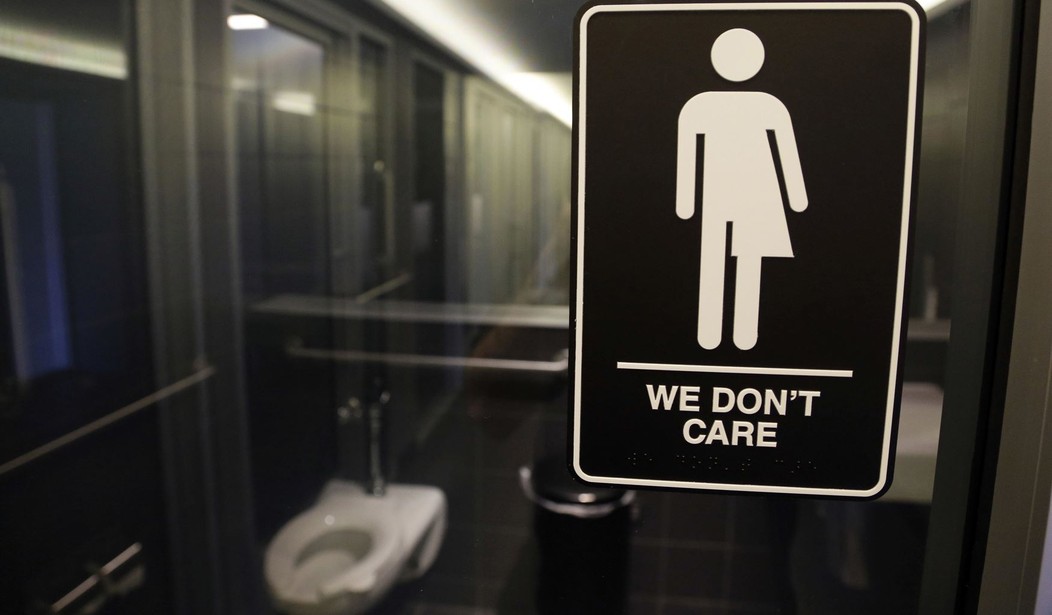If you've been here at RedState for more than approximately nine minutes, reading anything I've written, you'll know that, with a few exceptions, I'll always favor private-sector solutions over government ones. The government - at least under current management - is great at running a military, securing the border, and dealing with other countries. But most things, the private sector does better; there's an amusing story about a certain Nevada institution taken over by the IRS, which couldn't even turn a profit on a... Well, let's go into that another time.
The same principle applies to state and local governments. I've made that argument over, most notably, schools, for a few decades now, in my advocacy for privatizing education. In fact there are all manner of things that many local governments don't seem to be able to manage.
Spend enough time researching the subject, and one can be forgiven for abandoning all hope. Simply put, America’s public restrooms are a disaster.
First, there aren’t enough of them. Writer Quinn O’Callaghan considers the lack of options when nature calls among the plagues of “the modern urban hell-scape that make living in cities from Philadelphia to New York to Chicago to Los Angeles less convenient every year.” In 2023, The New York Times groused that “the United States has only eight public toilets per 100,000 people, according to the Public Toilet Index, a 2021 report by the British company QS Bathrooms Supplies” — well below “Iceland, the country with the highest density of public bathrooms: 56 per 100,000 people.” The Scripps News Group noted that America’s score “is comparable with the rate in Botswana.”
Second, one needn’t look far for examples of cities’ inability to build what were once known as “comfort stations” cheaply and speedily. In 2024, the San Francisco Chronicle’s Alec Regimbal attended the opening of the “newly installed and much-anticipated public restroom” in “San Francisco’s cozy Noe Valley neighborhood.” With an original price tag of a whopping $1.7 million, the loo became a poster child for California’s unaffordable, red-tape-driven construction costs. Per KGO-TV, the city “found a way to build it for a lot less, thanks to the generosity of two companies that have decided to donate a modular restroom with labor included and a few extra features.” Nonetheless, Regimbal’s experience with the facility was “mediocre, if not crappy.”
Interesting choice of words in that last sentence.
I'm not sure why this is such a difficulty. I've lived and worked in Japan enough to know that there, public restrooms are clean and well-maintained; I never saw a dirty or broken "WC" in Japan. China, not so much; my few experiences with public restrooms in China were enough to make one say, "You know what, no, I'll just go out in the bushes."
Here in the States, it's a mixed bag. Some states do well enough at maintaining the restrooms at highway rest stops, and it turns out that a lot of those are run by private-sector contractors. The National Forest Service, on campgrounds and picnic areas, again, it's a mixed bag. But in our major cities, it seems to be a real problem. Public restrooms in a lot of our cities range from nasty to downright dangerous, given some of the... people that take up residence in them.
Read More: The Kids Are All Right: SoCal High School Girls Walk Out to Protest Boys in Girls' Bathrooms
Colorado Grows Ever Loonier: Women Object to a Dude in the Capitol Women's Room, Are Told to Shut Up
Enter private enterprise.
...a D.C.-based startup thinks it can do better. Throne Labs envisions “a world in which people live their best lives — without worrying about where the closest restroom is.” Founded in 2020, the company’s units are “weather-proof and portable” and “intentionally designed to prevent and withstand all types of wear and tear.” Their “modular design allows us to respond quickly to damage and vandalism with on-site repairs.” Thrones are ADA compliant, and accessible “via mobile app, text or tap card.” Each user is limited to 10 minutes, and “24/7 monitoring” keeps “things moving” and “prevent[s] misuse.”
Michigan Enjoyer’s Bobby Mars extolled the company’s triumph in Ann Arbor: “Compared with your usual public facilities, this was the space shuttle of toilets. High-tech, with sliding doors, LED signs and a little red light where you wave your hand at the end to be let out.” Throne is “without a doubt, a victory of American capitalism.” Long Beach is pleased as well. The city recently extended its relationship with Throne, after a successful four-month pilot experiment.
Is urban America’s public-restroom nightmare coming to an end? Maybe. Government has certainly proven incapable of crafting a solution. There’s little to lose by empowering the private sector to find a fix.
Now that seems like a solid solution, for wastes both solid and liquid (hah). Not only does that modular design make dealing with anything ranging from malfunction to vandalism quicker and easier, but it appears that one has to have the phone app to access the potty. And the 10-minute limit eliminates camping in the facility, although the article is mute on precisely how that 10-minute limit is enforced. Tear gas? Throwing open the door?
In any case, this seems like a Number One solution. Initial indications are that the Throne Labs loos will never be Number Two to anything in the foreseeable future. It's another valuable lesson in providing public services - the default should always be as simple as issuing a contract to the private sector. It works for highway rest stops, and it seems it works in Ann Arbor. Throne Labs and similar solutions should be the next big thing in potties.















